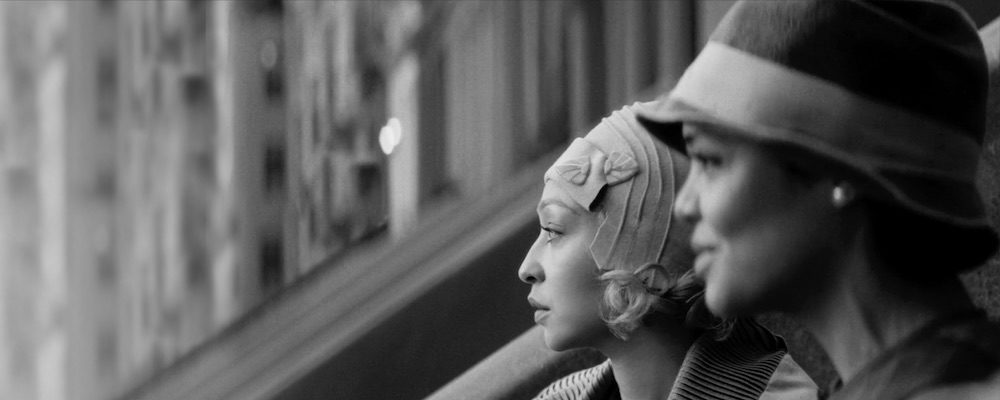In Rebecca Hall’s ‘Passing,’ Two Women Are Caught Between Race and Worlds
Sandra Miska
Race and womanhood in prohibition-era New York City are explored in “Passing,” the stirring directorial debut from Rebecca Hall. Based on the 1929 novel of the same name by Nella Larsen, the film follows two childhood friends whose lives have taken different paths. Shot in black and white, “Passing” is a stunning film about how life is anything but. Tessa Thompson stars as Irene Redfield, a Harlem wife and mother whose life is forever changed after she has an unexpected reunion with Clare Bellew (Ruth Negga) one summer afternoon at an upscale hotel. Irene, a light-skinned Black woman, is surprised to learn that Clare, a mixed-race woman, who was raised by white aunts, has been spending her adult life “passing” as a white woman. Over the next several months, the two women’s lives become intertwined, for better or worse.
Although Irene lives a relatively comfortable life with her doctor husband, Brian (André Holland), and their two sons, she still faces dangers as a Black woman, especially in spaces dominated by white people, so it is understandable when she becomes uneasy after she notices Clare staring at her that first afternoon. However, she is pleasantly surprised when Clare identifies herself to her as her old school chum. The pair catch up in Clare’s hotel room, where she reveals to Irene that not only has she been passing as a white woman, her wealthy husband, John (Alexander Skarsgård), has no idea. He is introduced to Irene, who he also assumes is white, and she is revolted to learn that he calls his wife “Nig” due to her darker complexion. Irene is so disturbed by John’s racism that she ignores letters that Clare sends her afterwards. However, she can’t ignore her when she shows up on her doorstep, and Clare becomes a regular visitor at the Redfield’s.
While Clare hides her racial identity, Irene volunteers for the Negro Welfare League, earning her respect from her community, as well as from the likes of famous white writer writer Hugh Wentworth (Bill Camp), who is also a good friend. Clare makes no secret that she misses being around other Black people, and it soon becomes apparent that she covets Irene’s life, as we see her cling to her friend like a life raft. While Brian doesn’t approve of Clare pretending to be someone she’s not, he is charmed by her, and Irene grows increasingly jealous, although it is not clear whom she is jealous of.
Despite the lovely period costumes and lively jazz music and dancing, there is a lot of sadness in this world that Thompson and Negga bring to life under Hall’s direction. Although Clare is living a blatant lie, we get the impression that Irene is also pretending to an extent, as she must masquerade as an impeccable wife and mother. She is far from perfect, and she displays a hint of classism when it comes to her Black housekeeper, Zu (Ashley Ware Jenkins). “We’re all passing for something,” Clare says at one point. Around each other, both women can let their respective masks slip off. Thompson and Negga are both phenomenal actors, and Thompson especially conveys a lot of emotion in numerous scenes with little dialogue, such as when she’s full of tension while doing household tasks, like making hot cocoa for her family. While her scenes with Negga are the best in the film, she also has some great moments with Camp and Holland. There’s a tension between Irene and her realist husband, who insists on reading their sons news reports of racist lynchings, while she would rather shield them from the hatred and ugliness.
“Passing” loses some momentum in the third act when Clare departs for a long vacation before returning for the dramatic climax. The shocking ending is precipitated by the deterioration of Irene and Brian’s marriage, as her once loving husband seems more cold and dismissive towards her. This shift in him is in so small part due to his attachment to Clare, and the obvious solution would be for Irene to cut ties with her friend, but her attachment to Clare has also become overwhelmingly strong. Brian once dreamt of leaving the States and settling his family in a less racist country, but Irene is surprised to see him no longer talk of those plans after he grows close to Clare. After some suspicions are indirectly confirmed, everything changes for all the main characters in the blink of an eye.
As the novel is told from Irene’s perspective, it is understandable that Hall would want to stay with her throughout the film. However, showing Clare in her home life (we never once see her little girl) would have added more richness. Overall, Hall has done a fine job of taking the tragic mixed-race female character — who is usually featured in more melodramatic films — and giving her more layers and nuance.
“Passing” releases Oct. 27 in select theaters and begins streaming Nov. 10 on Netflix.

